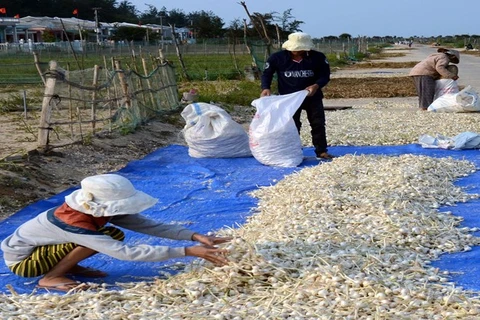Quang Ngai (VNA) – The overexploitation of white sand resource in Quang Ngai Province’s Ly Son island district – also known as Cu Lao Re – has led to a shortage of white sand.
This has thwarted the garlic farming activities of local residents.
White sand, or coral sand, has been used for years by Ly Son farmers to grow garlic. They cover the soil on which the garlic is planted with a 5cm layer of white sand and replace the layer with a new one every garlic growing season.
Decades ago, when white sand resource was easily available, farmers could walk out to the shore and get the sand from there. The easy accessibility made them unaware of how to judiciously use and preserve the resource.
Nowadays, with the quantity of white sand reducing, those who get it, sell it at high prices.
“They take rafts out to the ocean, some 7-8km away from the shore, mine the sand from there, then sell it to us at 500,000 VN D (22.4 USD ) per cart,” Le Van Be , a resident of An Vinh Commune, told VOV. “If we want them to deliver the sand to our farming area, we have to pay them double.”
The sand is sold at 140,000–150,000 VND (6.3-6.7 USD ) per cubic metre (excluding transportation fee), higher than the previous years.
According to local farmers, each unit of the farming area (about 497sq.m) needs to be covered with 3-4cu.m of sand. With a total farming area of 300ha, each year Ly Son’s farmers need 1.800-2.400cu.m of sand to grow garlic. However, at present, sand miners can only meet 70 percent of their requirement.
The district’s authority has collaborated with the province’s science and technology department and central research institutes to pilot a garlic farming project without using sand, Pham Thi Huong, Vice Chairwoman of Ly Son District’s People’s Committee, said.
However, the project did not succeed.
“For now, we have proposed to the agricultural department to encourage farmers to extract sand from one area, instead of exhausting all sources,” she said. “The department has agreed, and will soon decide on the area and announce it to local farmers.”-VNA






















